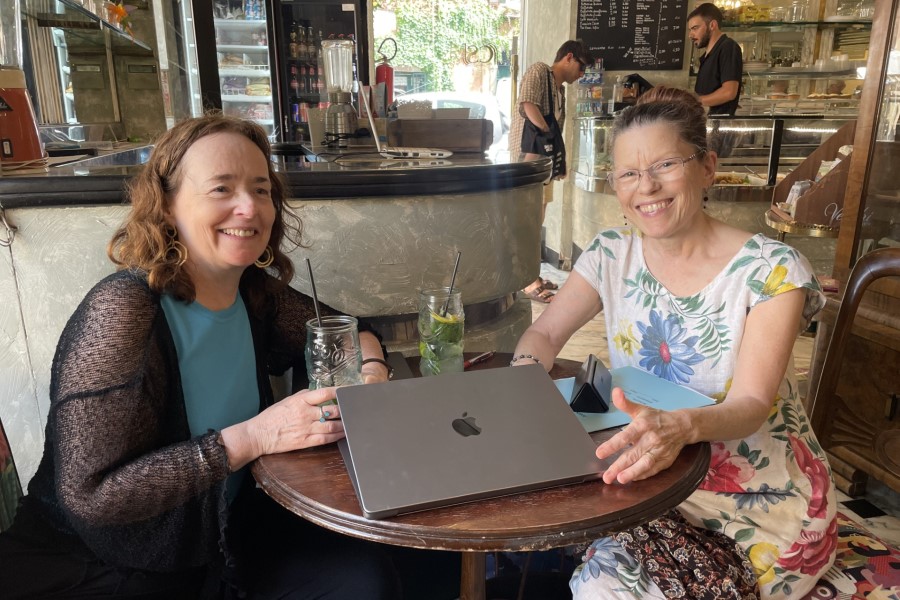Digital Media, Democracy, and the Press
Digital Media Panel Participants Included:
Peter Sarram (Moderator, Professor at John Cabot University)
Barbie Nadeau (Newsweek and The Daily Beast)
John Hooper (The Guardian, and The Economist)
Juan Carlos De Martin (Politecnico di Torino)
Maurizio Massari (Ministero Affari Esteri)
On February 9th, 2011, the Aula Magna Regina was flooded with students, professors and guests to listen to a panel on an issue that, since the advent of Wikileaks, has earned the attention of the world. Digital Media has usurped all other means of information transfer in terms of speed and efficiency, but as technology improves the winds of change are beginning to alter the way we receive news. A brief introduction to the topic was given by Professor Sarram, who commented that hacker culture has officially become mainstream since 2010. Since Wikileaks the spotlight has been turned to hacker culture, and its impact on media. Facebook and Wikipedia have proven not to be mere fads, but an intricate system of information communication.
Juan Carlos De Martin from the Politecnico di Torino gave a technical view of what has changed in the last 20 years of information technology. It is important to understand how even the most basic technology has changed to understand how we have arrived at our current state of affairs. The remarkable improvement of bit technology has opened the door for innovation. Today one can make infinite copies of files at low costs that are easy to transfer. The creation of space in hard drives is the fastest improving technology today; huge amounts of information (USB, hard-disks, etc), has evolved at a daunting rate. Today there are drives that are compact and practical, yet have the ability to store entire libraries. The use of encryption techniques is not merely limited to governments, but rather is a power given to any ordinary citizen. The ability to collaborate, organize and publish information has now become easier than ever.
Many engineers are faced with a paradox in attempts to control digital media and technology, through the use of technology. “Bits are very liquid, more like a gas.” Anyone who wishes to leak information is now able to do so. One remarkable change is the shift in power from the intermediaries to the hackers, the result of which is a leak of information that is uncensored and unfiltered. While this may sound frightening much of this information brings us out of ignorance and allows the public to be aware of issues within governments. Similar to Kant’s Liberal Theory, transparency with the people is needed. If something is being kept a secret it is likely that there is something sinister behind it.
Maurizio Massari then commented on the relationship between media and foreign policy. The free flow of information and differentiation of sources has enhanced the way people receive their information as well as the type of information they receive. This new era of technology and information sharing has enriched democracy and its liberal values. However, this innovation does not come without some consequences.
Most notably, there is too much information coming from too many sources. Politicians and policy makers find themselves getting sidetracked by news. Political messages become less effective, and any piece of news can become the center of attention at any time leaving no chance for anyone to decide matters of chronology. Immediacy sounds like a good thing, but it provides media sources with as many challenges as it does the viewers. Foreign policy is often decided as a response to media before any time has been given to make a critical evaluation of information, and its credibility. Tremendous challenges have surfaced in the realm of diplomacy. Should diplomats have the right to privacy, exempt from the hysteria of the public? Politicians and diplomats will have to think twice before opening their mouths, whether it is during an official interview or behind closed doors. Democracy and liberal values are prospering with this new flow of information, but the issue remains that we pay the price as to the quality of democracy and personal security.
Any possible remedy for what has happened will be very difficult because of the unstoppable flow of information. However, we must manage to find a way to tighten up the security belt and limit the risk of leaks. It’s up to the people, the media, and the politicians to show a responsible attitude towards the quality of information that is released.
Next Barbie Nadeau from Newsweek and The Daily Beast commented on the evolution of media, and the hurtful effect Wikileaks has had on those who work in “old media.” Thus far, the advent of a new technological means of conveying information has never replaced its predecessor. For example the invention of the radio did not replace newspapers, just as the invention of the television did not replace radios etc… And while the internet and the hacker culture has not yet replaced traditional media, it has however, provided them with unprecedented challenges.
As a journalist, one has to fight the urge to tell viewers everything. However, recently the information being conveyed to people is happening too fast for anyone to keep up. There exists a responsibility to balance between what should be told and what can be told. This “New Media” is constantly forcing traditional media to adapt, thus merging the old and new. The emergence of this new kind of media is new for absolutely all of us, especially those who work in traditional media sources.

John Hooper
Next John Hooper, the Rome correspondent for The Economist and The Guardian spoke about a wide range of issues facing the world of media. He began with a humorous anecdote about a man who was once banned from reading “The Sun.” Now a days it’s hard to imagine a day in which the media had that much control over who is able to read what. Just 15 years ago everything used to be checked and controlled, and it was easier to restrict information.
In these regards the emergence of the internet has been an utterly positive one. There have been great advantages such as facilitating contribution from readers. News sources are able to be more in touch with the audience, who now has access to sources anywhere where there is wifi. However, there are 2 sides to this innovative story. John Hooper echoed the sentiments of the speakers before him that things happen entirely too fast. The pressure to compete can compromise the ability to write accurate articles. There is an increased risk of necessary details missing from articles. There is little time to scrutinize and analyze the works that are released.
Wikileaks is an entirely new thing. It is a combination of the sources and the outlet. While the state department faced embarrassment from some of the leaks, nothing that was released was classified as top secret. Much of the information that was released was predictable, but rather gave further insight. However, people need to be cautious when reading these sources because it’s hard to define what is credible. Fact checking has become increasingly difficult. The difficult thing to decipher is where to draw the line. At what point does a journalist become professional? Journalism is no longer a closed profession, and has become one of the largest industries. One concern is the diminishing demand for hardcopy news sources. There has been a lot of doubt about the time that hardcopy newspapers will be around. Many people like the convenience of hardcopy magazines on their coffee tables, but for some having a copy of expensive issues such as Monocle have become a mere fashion statement.





